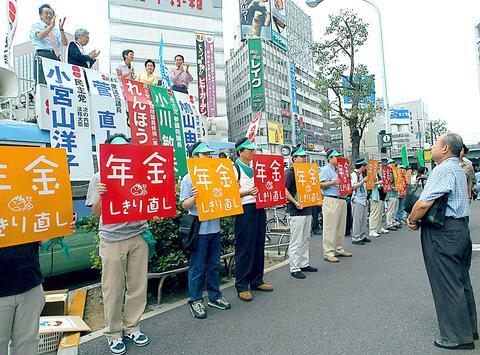Japan's ruling and opposition party chiefs made their final appeals to voters yesterday, a day before an election that could determine the fate of Prime Minister Junichiro Koizumi.
Koizumi's ruling coalition cannot be ousted from power as a result of the election for parliament's upper house, as it holds a majority in the powerful lower chamber.
But a poor showing in elections for the upper chamber would weaken his clout and might invite calls for his resignation.

PHOTO: AP
Koizumi, his voice hoarse on the final day of the election campaign, urged scores of voters who were gathered in Tokyo's Ginza shopping district despite pouring rain, to vote for his Liberal Democratic Party (LDP).
Yasunori Yamazaki, a 31-year-old computer engineer who stopped to listen to LDP members stump as he was passing by, said he was undecided but leaning toward voting for the ruling party.
"If you look at Japanese politics up to Koizumi, Koizumi is so much better," Yamazaki said.
Such support would be welcome for Koizumi and his party in what could be a tightly contested elec-tion. A survey published by the Asahi Shimbun daily on Friday showed that voters were about evenly split between the LDP and the main opposition Democratic Party.
The LDP appeared to have recovered some ground from previous polls, but the survey was largely in line with those released earlier this week showing that it was in danger of falling short of its goal of winning 51 of the 121 seats being contested.
The upper chamber has a total of 242 seats, with elections for half of them held every three years.
If the LDP performed poorly and won only 44 seats, that would almost certainly force Koizumi to step down, analysts say.
While Koizumi stumped in the urban centers of Osaka and Tokyo, Katsuya Okada, the leader of the main opposition Democratic Party, spent the day in southwestern Japan, seeking to bolster support in closely-fought rural districts where his party has been weak.
Friday's emotional reunion of a Japanese woman abducted by North Korea decades ago with the US ex-soldier she married and had to leave behind in Pyongyang when she came home in 2002 just might tip the scale toward the LDP.
Japanese media gave heavy coverage to the Jakarta reunion of Hitomi Soga with Charles Robert Jenkins and their two daughters, and some voters might credit Koizumi with making it possible.
That would be a welcome relief for Koizumi, whose party has been on the defensive over public dissatisfaction toward pension reforms.
Also See Story:
Alleged deserter spends first day outside N Korea

The US government has signed defense cooperation agreements with Japan and the Philippines to boost the deterrence capabilities of countries in the first island chain, a report by the National Security Bureau (NSB) showed. The main countries on the first island chain include the two nations and Taiwan. The bureau is to present the report at a meeting of the legislature’s Foreign Affairs and National Defense Committee tomorrow. The US military has deployed Typhon missile systems to Japan’s Yamaguchi Prefecture and Zambales province in the Philippines during their joint military exercises. It has also installed NMESIS anti-ship systems in Japan’s Okinawa

TRAGEDY STRIKES TAIPEI: The suspect died after falling off a building after he threw smoke grenades into Taipei Main Station and went on a killing spree in Zhongshan A 27-year-old suspect allegedly threw smoke grenades in Taipei Main Station and then proceeded to Zhongshan MRT Station in a random killing spree that resulted in the death of the suspect and two other civilians, and seven injured, including one in critical condition, as of press time last night. The suspect, identified as a man surnamed Chang Wen (張文), allegedly began the attack at Taipei Main Station, the Taipei Fire Department said, adding that it received a report at 5:24pm that smoke grenades had been thrown in the station. One man in his 50s was rushed to hospital after a cardiac arrest

PUBLIC SAFETY: The premier said that security would be tightened in transport hubs, while President Lai commended the public for their bravery The government is to deploy more police, including rapid response units, in crowded public areas to ensure a swift response to any threats, President William Lai (賴清德) said yesterday after a knife attack killed three people and injured 11 in Taipei the previous day. Lai made the remarks following a briefing by the National Police Agency on the progress of the investigation, saying that the attack underscored the importance of cooperation in public security between the central and local governments. The attack unfolded in the early evening on Friday around Taipei Main Station’s M7 exit and later near the Taipei MRT’s Zhongshan

ON ALERT: Taiwan’s partners would issue warnings if China attempted to use Interpol to target Taiwanese, and the global body has mechanisms to prevent it, an official said China has stationed two to four people specializing in Taiwan affairs at its embassies in several democratic countries to monitor and harass Taiwanese, actions that the host nations would not tolerate, National Security Bureau (NSB) Director-General Tsai Ming-yen (蔡明彥) said yesterday. Tsai made the comments at a meeting of the legislature’s Foreign Affairs and National Defense Committee, which asked him and Minister of National Defense Wellington Koo (顧立雄) to report on potential conflicts in the Taiwan Strait and military preparedness. Democratic Progressive Party (DPP) Legislator Michelle Lin (林楚茵) expressed concern that Beijing has posted personnel from China’s Taiwan Affairs Office to its